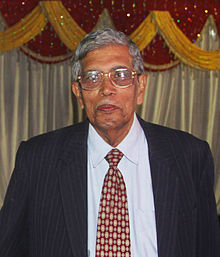Sitakant Mahapatra
| Sitakant Mahapatra ଶୀତାକାନ୍ତ ମହାପାତ୍ର |
|
|---|---|

Sri Mohapatra in 2015
|
|
| Born |
17 September 1937 Mahanga, Cuttack, Odisha |
| Nationality | Indian |
| Occupation | poet, literary critic, bureaucrat |
| Notable work |
Sabdar Akash (The Sky of Words) (1971) Samudra (1977) |
Sitakant Mahapatra (born 17 September 1937) is an eminent Indian poet and literary critic in Odia as well as English. He was in the Indian Administrative Service (IAS) since 1961 until retiring in 1995, and has held ex officio posts such as the Chairman of National Book Trust, New Delhi since then.
He has published over 15 poetry collection, 5 essay collections, a travelogue, over 30 contemplative works, apart from numerous translations. His poetry collection have been published in several Indian languages. His notable works are, Sabdar Akash (1971) (The Sky of Words), Samudra (1977) and Anek Sharat (1981).
He was awarded the 1974 Sahitya Akademi Award in Odia for his poetry collection, Sabdar Akash (The Sky of Words). He was awarded the Jnanpith Award in 1993 "for outstanding contribution to Indian literature" and in its citation the Bharatiya Jnanpith noted, "Deeply steeped in western literature his pen has the rare rapturous fragrance of native soil"; he was also awarded the Padma Bhushan in 2002 and Padma Vibhushan in 2011 for literature apart from winning the Soviet Land Nehru Award, Kabeer Samman and several other prestigious awards.
Born in 1937 in village Mahanga, situated on the banks of Chitrotpala, a tributary of the great Mahanadi, Sitakant Mahapatra grew up reciting a chapter of Odia version of Bhagwad Gita in a traditional household. After his schooling from Korua government high school, he chose to join Ravenshaw College, Cuttack (then affiliated with Utkal University), where he did his B.A. in History Honours 1957, this was followed by master's degree in Political Science from Allahabad University in 1959. During that time, he was the editor of the university journal. It was here that he started writing both in English and Odia, though later he decided to write poetry solely in his native, Odia realising that "a poet can express himself only in the language in which he dreams", his scholastic works however are in English.
...
Wikipedia
